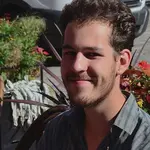Manuel Moser
manuel.moser@uni-erfurt.deDoktorand (Max-Weber-Kolleg für kultur- und sozialwissenschaftliche Studien)
Sprechzeiten
nach Vereinbarung
Besucheranschrift
Max-Weber-Kolleg für kultur- und sozialwissenschaftliche Studien
Campus
Nordhäuser Str. 63
99089 Erfurt
Postanschrift
Universität Erfurt
Max-Weber-Kolleg für kultur- und sozialwissenschaftliche Studien
Postfach 90 02 21
99105 Erfurt

Zur Person
Curriculum Vitae
- Ab Okt. 2019: Doktorand an der IGS des Max-Weber-Kollegs
- 2017 – 2019: Máster oficial de Internacionalización: Aspectos económicos, empresariales y jurídico-políticos (Universitat de Barcelona)
- (2016): Sémestre d’échange en Sciences des Religions (Université du Québec à Montréal)
- 2014 – 2017: B.A. in Religionswissenschaften (zweisprachig) und Medien- und Kommunikationswissenschaft (Université de Fribourg / Universität Freiburg)
Forschungsprojekt
Anthropology of cars: Resonances in the relationships between drivers and their vehicles
Do our interactions with things challenge the very idea of alienation ”Entfremdung”? I argue so by assuming that we cannot only experience meaningful resonances in the relations to fellow human beings or higher entities, but also in our relationships to material beings. In my dissertation project, I will therefore analyse the ways professional drivers interact with their vehicles. The research question will be to what extent the resonance theory serves to interpret the often very close relationships between drivers and their vehicles. Methodologically I will enrich the theory with empirical data obtained through participant observations and qualitative interviews with drivers in Germany and Bolivia. The research can build onto one of my former projects that showed that Bolivian drivers repeat at least two rituals annually to bless their vehicles: The first, the ”bendición” is a blessing performed by a Catholic priest and usually associated with a pilgrimage. The second, the ”ch'alla”, is a ritual that the drivers perform themselves or for which they engage with traditional healers, and which is developed along the burning of a plate of offers called ”k'oa”. A common experience among all interviewed drivers was that these two rituals provide effective influence by reducing danger in the sense of a positive reciprocity. Nevertheless, some, but not all, also argued that not doing the rituals correctly will result in direct negative impacts like accidents and incidents, which are understood as forms of divine punishments. This data will be complemented with new empirical fieldwork in Germany and Bolivia, putting special emphasis on the driver-vehicle-relations. As helpful theoretical frames, I will draw on the acceleration thesis and resonance theory by Hartmut Rosa, on Bruno Latour's Actor – Network Theory and other theoretical concepts in the perspective of the anthropology of things, which understand not only humans, but also things as ”actants” influencing people with their actions. The already collected empirical data underlines this, as all interviewed drivers perceive their vehicles to have an independent agency of their own. Furthermore, it is interesting on a theoretical ground to examine where the sociological explanations and the Andean concept of sumak kawsay or suma qamaña (buen vivir, good life), which also extends ”life” to nonhuman beings and which encourages the active maintaining of an overall harmony, do overlap and where they give different interpretation frames. The aim of this study is to contribute to closing the research gap between Western science and non-Western knowledge, caused by centuries of neglecting and/or orientalising of indigenous ”Weltanschauungen”. Obviously it must consider that it is crucial not to oversimplify the analyses by decontextualizing the different backgrounds, but it shall try to understand the entanglements.
Publikationen
-
Pausing, Waiting, Dwelling. Experiences and Interactions during Stopovers in Transport Infrastructures. In: Mobility Humanities. Vol. 3/2 (2024 [forthcoming]). Special Issue edited together with Michael Anranter.
-
Vivir Bien. Diálogos transculturales e interdisciplinarios entre Latinoamérica y Europa. Frankfurt am Main / Madrid: Iberoamericana – Vervuert (2024 [forthcoming]). Joint Volume edited together with Fernando Galindo and Werther Gonzales León.
-
At Home on the Road or Dwelling in Mobility: A Case Study of East-German Long-Haul Lorry Drivers. In: Mobility Humanities. Vol. 3/2 (2024 [forthcoming]).
-
Interactuar con no-humanos para vivir bien. El caso de camioneros del Occidente boliviano. In: F. Galindo, M. Moser, W. Gonzales León (eds.): Vivir Bien. Diálogos transculturales e interdisciplinarios entre Latinoamérica y Europa. Frankfurt am Main / Madrid: Iberoamericana – Vervuert (2024 [forthcoming]).
-
A Triangle of Mary. Relating Religious Artefacts to Non-Religious Truck Drivers. In: E. Begemann, D. Pavel, G. Petridou, R. Raja, A.-K. Rieger, J. Rüpke (eds.): Magnification and Miniaturization in Religious Communications in Antiquity and Modernity. Materialities and Meanings. Contextualising the Sacred. Turnhout: Brepols (2023). pp. 211 – 224.
-
East to West to South to North and Back. Driving Landscapes as a Thuringian Long-Distance Trucker. In: Transfers. Interdisciplinary Journal of Mobility Studies, Vol. 12/1 (2022). URL: https://www.berghahnjournals.com/view/journals/transfers/12/1/trans120104.xml; DOI: 10.3167/TRANS.2022.120104.
-
Andino-catholic Rituals in Automobile Bolivia. Bendiciones, Ch’allas and K’oas Performed by Drivers from Chuquisaca. In: International Journal of Latin American Religions. Vol. 5/2 (2021). URL: https://link.springer.com/article/10.1007/s41603-021-00145-3; DOI: 10.1007/s41603-021-00145-3.
-
Paul-François Tremlett, Towards a New Theory of Religion and Social Change: Sovereignties and Disruptions. Book review. In: Zeitschrift für junge Religionswissenschaft, Vol. 16 (2021). URL: https://journals.openedition.org/zjr/1610; DOI: 10.4000/zjr.1610.
-
Der andino-katholische Synkretismus im urbanen Bolivien am Beispiel der Motorfahrzeugsegnungen. In: Zeitschrift für junge Religionswissenschaft, Vol. 15 (2020). URL: http://journals.openedition.org/zjr/1408; DOI: 10.4000/zjr.1408.
-
Protegido. Autosegnungen in Bolivien. Short film on bachelor thesis on andino-catholic syncretism. Displayed in October 2018 at the Ethnokino Bern (Kino in der Reitschule).
-
Ceno ergo sum. Ich esse, also bin ich. Short film about the everyday life of a vegan family in Switzerland. Co-production with Zita Bauer and Chantale Fitzé. Displayed in September 2016 at the University of Fribourg/Freiburg.

